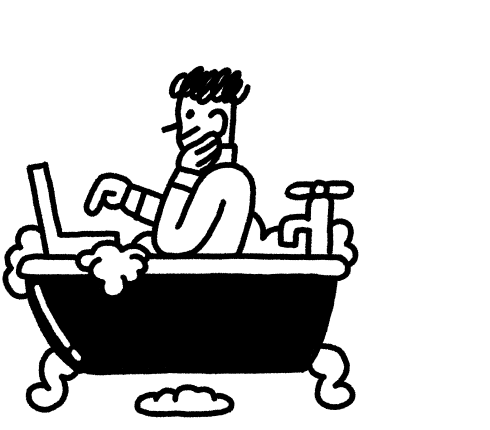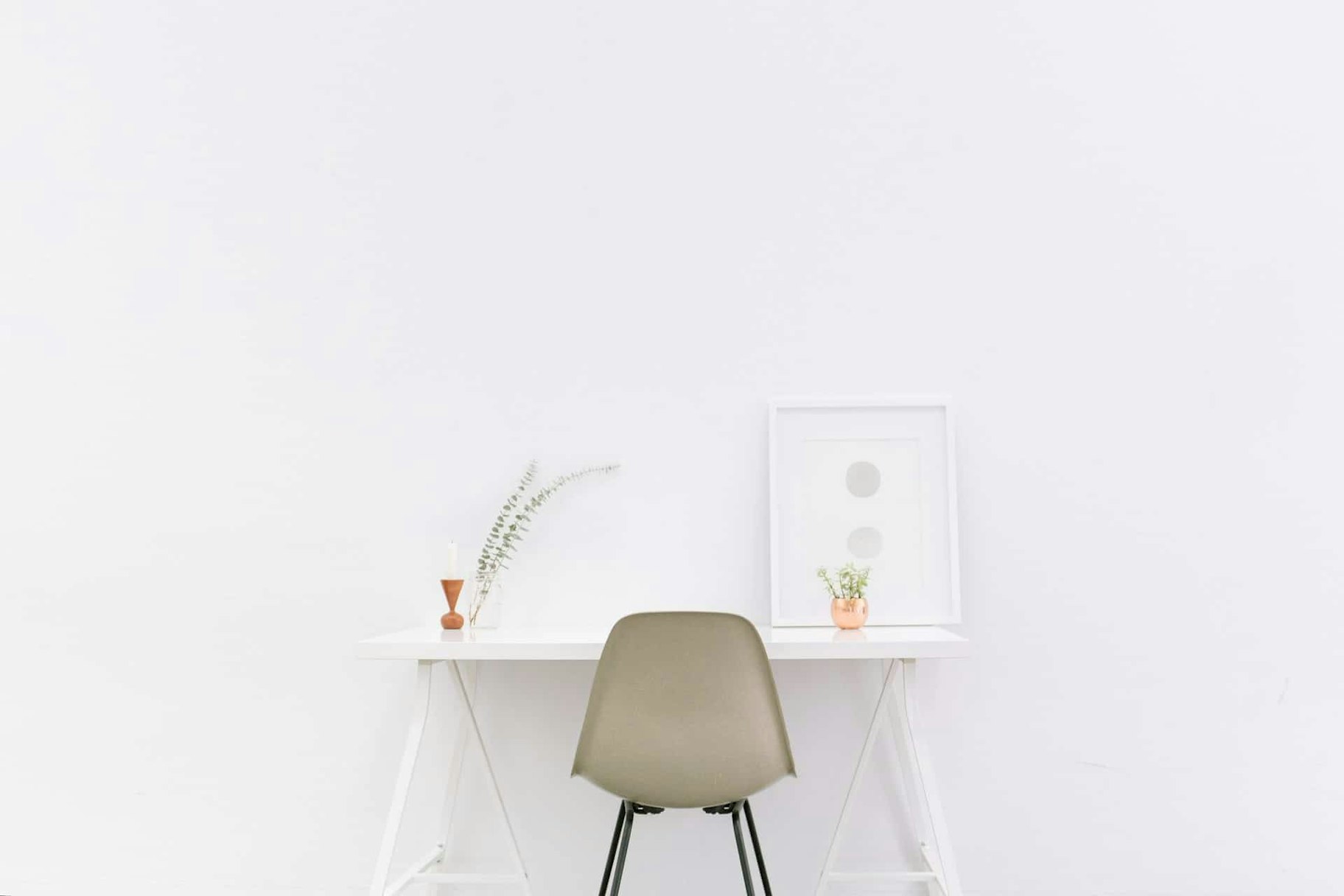Minimalism.
You’ve probably heard much talk of this stylish, controversial, and intriguing concept. But what is minimalism? And how can you use the principles of minimalism to improve your life?
For many, these questions are more important than ever.
According to research by Stanford University, an incredible 5.2 percent of the US workforce say they work from home permanently. If you’re one of these people, you may be tasked with unexpectedly cramming an office into your home.
In this article, you’ll learn about the advantages and principles of minimalism, and how to create a minimalist home office setup. These tips can help you increase focus, productivity, and wellbeing – and who knows, minimalism may just change your life!
Let’s get into it.

Unlock the guidance, tools, and resources you need to design your best life – then live it. Every. Single. Day.
Design your dream life TodayWhat is Minimalism?
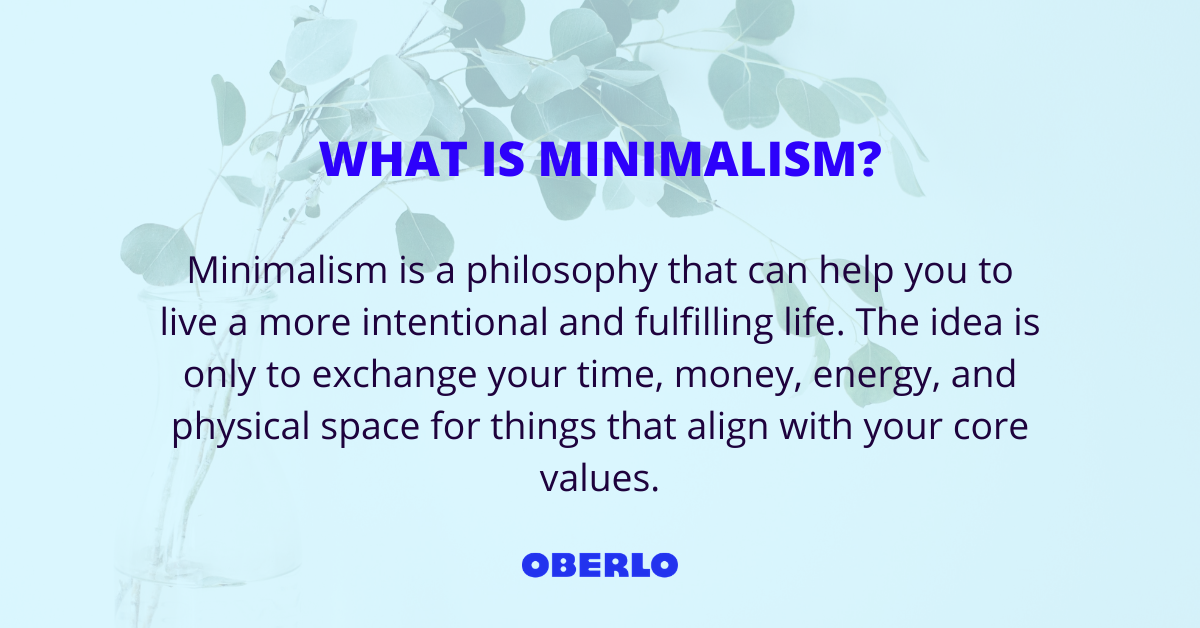
Minimalism is a philosophy that can help you to live a more intentional and fulfilling life. The idea is only to exchange your time, money, energy, and physical space for things that align with your core values.
The minimalist writer Joshua Becker writes, “Minimalism is the intentional promotion of the things we most value and the removal of anything that distracts us from it.”
Minimalism has many different aspects to it, but the core philosophy is supported by conventional wisdom, such as “less is more,” “quality, not quantity,” and “focus on what’s important.”
Minimalism isn’t about having few possessions or depriving yourself of life’s comforts. It’s not a new craze or fad, either – minimalism has been around for thousands of years.
Living a Minimalist Lifestyle: 6 Principles of Minimalism
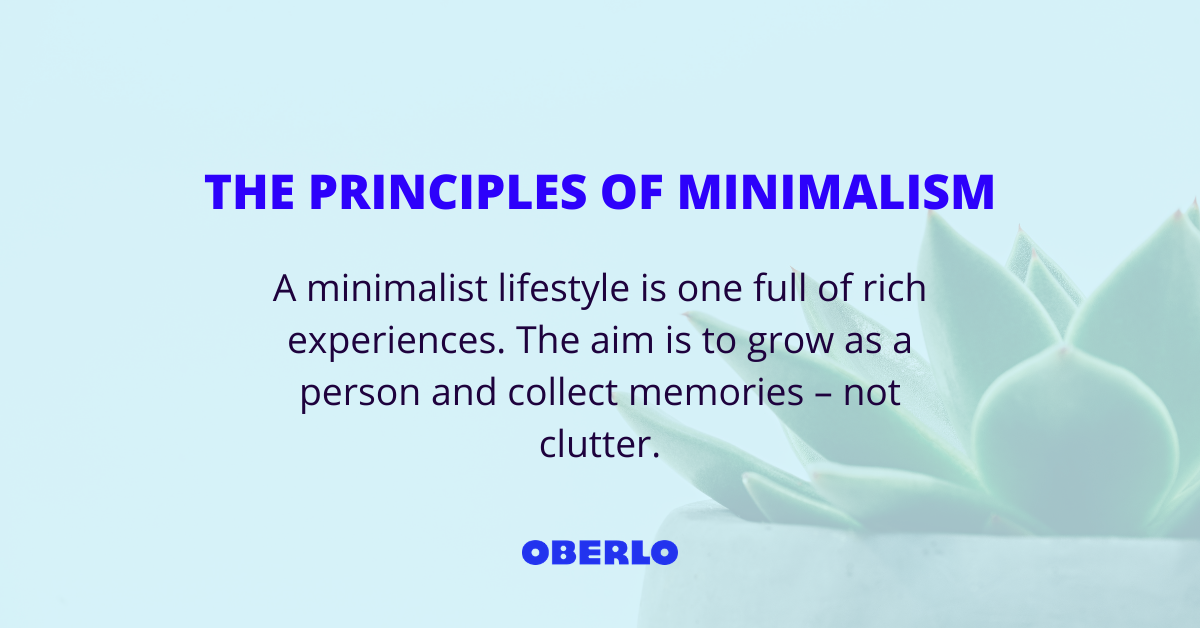
Let’s explore six principles of minimalism to understand this philosophy and the practices that minimalists use to enjoy it.
1. Your Wellbeing, Time, and Happiness are More Important Than Wealth, Status, and Possessions
What’s the point in having a brand new car on credit when you’re behind on your bills? What good is a gigantic house when you work so much that your health suffers as a result?
Living a minimalist lifestyle means placing your wellbeing and values above material wealth and status.
As the reformist British politician, Joseph Brotherton, said, “My riches consist, not in the extent of my possessions, but in the fewness of my wants.”
2. Money is a Means to an End – Not a Goal
Minimalists appreciate that money always comes at a cost, such as time, energy, or even the location your job requires you to be.
In minimalist living, money is simply a tool used to create a fulfilling life intentionally. As a result, wealth could never be a goal in itself – a meaningful, fulfilling life is the goal.
3. Experiences Are More Valuable Than Possessions
Minimalists appreciate that possessions come and go. Everything we ‘own’ is borrowed – after all, we can’t take it with us when we die.
A minimalist lifestyle is one full of rich experiences. The aim is to grow as a person and collect memories – not clutter.
4. Buying Things We Don’t Value Contributes to Our Unhappiness
Will Rogers, an American actor in the early 20th century, once said, “Too many people spend money they haven’t earned, to buy things they don’t want, to impress people they don’t like.”
Minimalists try to ensure that everything they buy increases their long-term fulfillment. Whether that’s a painting they’ll love forever, or a salad instead of a burger to nurture their health and vitality.
As the writer and designer William Morris said in the 1800s, “Have nothing in your homes that you do not know to be useful or believe to be beautiful.”
5. Remove Things From Life That Don’t Bring Joy
Similarly, minimalists try only to keep the possessions, relationships, hobbies, and even ideologies, that bring them joy and fulfillment.
For example, perhaps all those DVDs were fun, but now they just gather dust and take up space.
Minimalist author Marie Kondo said, “The best way to choose what to keep and what to throw away is to take each item in one’s hand and ask: ‘Does this spark joy?’ If it does, keep it. If not, dispose of it.”
Plus, you can always sell unwanted stuff online.
6. Eliminate Things That Distract You From a Deeply Fulfilling Life
These days, it seems everyone and everything wants our attention, whether it’s constant messaging, social media, gossip, or advertisements.
Minimalists aim to maintain control of who they give their precious attention to. For example, minimalists often limit their social media use and spend the time developing their real-life friendships.
5 Advantages of a Minimalist Home Office Design
Now that you understand what minimalism is and some of the principles that underpin it, let’s explore the advantages of a minimalist home office setup.
1. Save Money and Enjoy Higher Quality Items
When you create a minimalist home office, you’ll naturally purchase fewer furnishings. This allows you to either save money for something else or purchase higher-quality items.
2. Enjoy a Stylish Minimalist Home Office Design
Francis Jourdain, who’s often considered the father of French modernism, once said, “One can furnish a room very luxuriously by taking out furniture rather than putting it in.”
A minimalist home office could be a fast-track to luxury and style. As the renaissance painter Leonardo da Vinci said, “Simplicity is the ultimate sophistication.”
3. Reduce Stress
Clutter can cause stress – you know what they say, “tidy space, tidy mind.” With a minimalist home office setup, your space will never cause you to misplace items or feel overwhelmed.
4. Claim Back More Time and Energy
Without so much clutter and furniture, cleaning and tidying is easy. Plus, organizing your minimalist home office is a one-time job – then it’s easy to keep it that way.
So, you can enjoy spending the extra time and energy on activities that truly matter to you, whether it’s spending time with loved ones or catching up on some ‘me’ time.
Joshua Becker writes in his book, The Minimalist Home, “Maybe after entering your home office on a Saturday morning and realizing you’re totally caught up with your office chores, you can plan how to begin that part-time business you’ve been thinking about.”
5. Increase Your Focus
Distractions can severely hamper your work efforts.
With less to distract you, a minimalist home office can help you to focus. Then, not only will you feel less frazzled throughout the day, you can also finish earlier and free up some precious time.
How to Create a Minimalist Home Office Setup
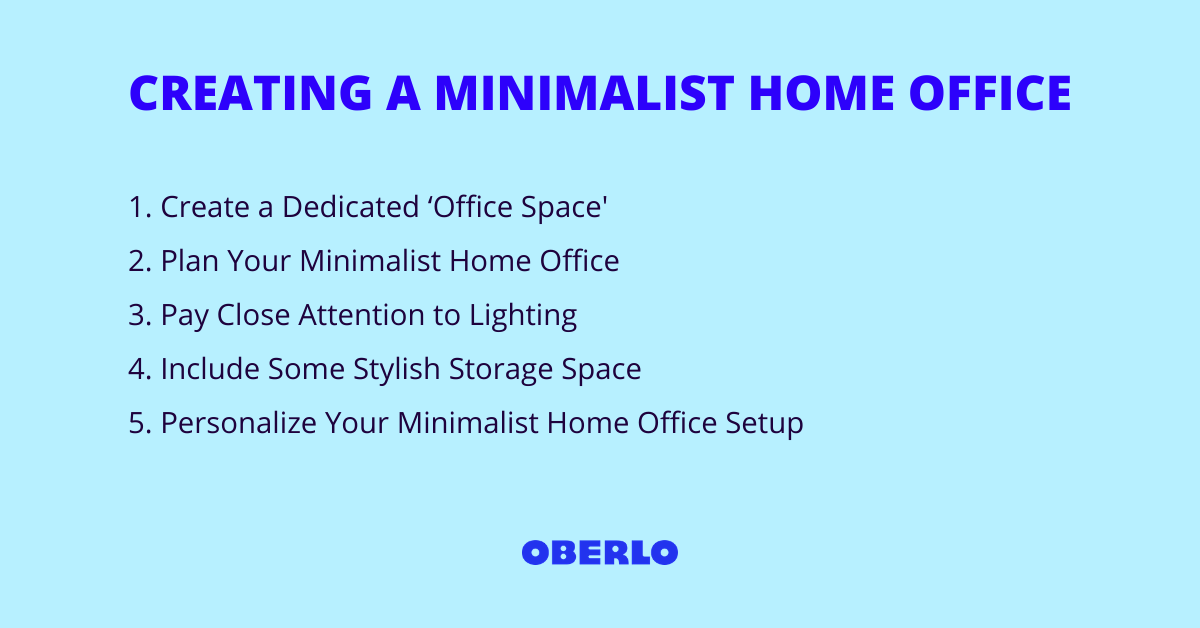
What does a minimalist home office setup look like, and how can you create one? Here are five minimalist home office design ideas to consider.
1. Create a Dedicated ‘Office Space’
If you don’t have a spare room to use as an office, try to create a dedicated space or ‘zone’ for your minimalist home office. For example, you could choose a corner or use a rug to create some separation.
2. Plan Your Minimalist Home Office
Remember to keep it simple and not try to cram too many ideas into your minimalist home office. Start with your desk, a chair, and a few choice items.
3. Pay Close Attention to Lighting
When you don’t have many things, it’s important to frame them well. Proper lighting is essential when creating a minimalist interior. You could use natural light or find some attractive lighting to create a cozy office.
4. Include Some Stylish Storage Space
Although you won’t have many possessions in your minimalist home office, it helps to have storage space to keep some items out of sight. Consider a small chest of drawers under your desk.
5. Personalize Your Minimalist Home Office Setup
Finally, make sure to personalize your minimalist home office to make it uniquely yours. You could hang a picture, get some plants, or add a couple of inspiring books.
Final Thoughts: Minimalist Home Office Design
Minimalism is the practice of simplifying your life to increase your contentment and joy.
A minimalist home office design can help you save money, reduce stress, free up time, and focus more. Plus, you’d get to enjoy a stylish minimalist interior!
As the French writer, Antoine de Saint-Exupery said, “Perfection is achieved, not when there is nothing more to add, but when there is nothing left to take away.”
